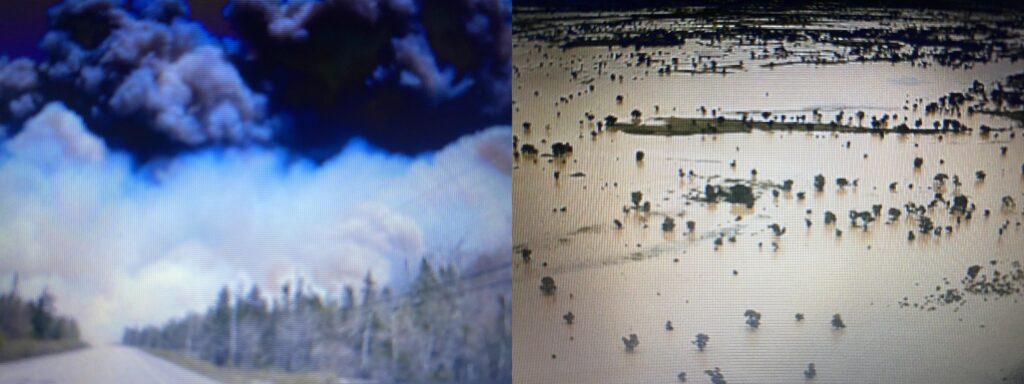Across continents, nature is making bold destructive statements from the raging wildfires in the quiet forests of Manitoba to the storm-induced chaos in some parts of Nigeria. These disasters, while miles apart, have something in common, the devastating impact on lives, property, and livelihoods.
But in the midst of all these crises, one question rises to the surface: Who pays the price when disaster strikes? The government? The people? Insurance?
Canada: Manitoba on Fire
In recent weeks, Canadian province of Manitoba has faced one of its worst wildfire seasons in recent history. Communities like Cranberry Portage, Lac du Bonnet, Flin Flon, and Lynn Lake have seen residents evacuated as the fire closed in with homes destroyed, and entire towns covered in toxic smoke.
The fires have left many homeless and stranded, with roads blocked and communication cut off in several areas. Local authorities have declared states of emergency in some areas. Emergency services are stretched thin as flames consume homes and memories. But amid the ashes, there is a difference, many of these residents are insured and can expect help, at least financially, to rebuild their lives.
Nigeria: Storms, Floods, and Fragile Recovery
Now, contrast this with Nigeria, where storms have battered communities in Lagos, Niger, Maiduguri, and Bayelsa, causing flooding, power outages, property destruction, and in some tragic cases, loss of life.
In Niger, for instance, a recent flood in Mokwa displaced thousands as flood water submerged homes and infrastructure. The flood caused significant destruction to roads, bridges and building disrupting transportation and communication networks. Yet, for the vast majority of victims, insurance was not even an option. People turn to prayers, friends, or government palliatives.
The reality in Nigeria is stark:
- Insurance penetration remains low.
- Many homes and businesses are uninsured.
- Flood and storm covers are either unavailable, unaffordable, or simply unknown.
For most Nigerians, disaster relief is expected from the government, which is often too slow or overwhelmed to meet real needs. Insurance companies, on the other hand, are reluctant to underwrite natural disasters due to lack of reliable data, infrastructure challenges, and inconsistent government support.
Two Nations, Different Realities, But a Shared Need
Both Canada and Nigeria are victims of climate-induced chaos. But the difference lies in the response and recovery. The contrast is painful. In Manitoba, insured families may return to rebuilt homes in time. In Nigeria, many victims of storm damage will spend years recovering, if they ever recover. But the lesson is universal, Insurance is not just a business tool. It is a lifeline. Whether you live in a country with advanced insurance systems or a developing one, the ability to recover from disaster depends not just on hope or prayer but on financial protection.
What Nigeria Must Learn
It’s time for Nigeria and much of Africa to rethink disaster preparedness:
- Invest in public insurance education campaigns.
- Offer affordable storm and flood policies.
- Partner with insurers to subsidize risk in high-exposure zones.
- Use technology and data to improve underwriting accuracy, pricing and claims
- Enforce disaster coverage for housing, business, and public infrastructure projects.
Conclusion: Covered or Cornered?
In Manitoba, fire victims are rebuilding.
In Nigeria, storm victims are still asking, “Where do we go from here?”
Nature does not discriminate but outcomes do. And often, that difference is insurance.
Whether you are a landlord, business owner, farmer, or tenant, ask yourself: If disaster comes, am I covered or cornered?
Let’s not wait until the next storm or fire to act. Governments must support risk pooling mechanisms. Insurance companies must innovate and citizens must see insurance not as a luxury, but as a necessity because when fire and flood come calling, those with coverage stand a better chance at tomorrow.
The time to prepare is now.
Let’s talk insurance, preparation, and what must change. Let’s shift the conversation from relief to resilience.



Yet another great article. You can ‘hear’ the passionate plea in this one. I hope insurance becomes common place amongst Nigerians very soon.
Quick question though. Do insurance companies have a reward system though. For example rewarding companies or individuals who pay premium regularly but do their utmost best to avoid disasters that lead to frequent claims? Like let’s say a company goes 10 years without making a single claim. Can the insuring company ‘reward’ them of some sort so it doesn’t feel like money down the drain for the company since they have never needed to make a claim in those 10 years.
Thanks for your comments. This is a recurring question, and the answer is yes, some companies have added a profitability bonus to their products after years of no claim. I guess we need more publicity in this regard. Many thanks again.
A great article in deed. However, on one hand, one can attribute low penetration of Insurance in Nigeria to low knowledge on Insurance, benefits of Insurance and implications of not being insured, and on the other hand, adverse impact of economic situation on the populace purchasing power in Nigeria now.
I would suggest that both governments and Insurance practitioners should do more on public awareness on Insurance benefits and the attending consequences in the event of occurrence of unexpected.
The Insurance practitioners also need to encourage, as a way of giving back, to those who are struggling to maintain good insurance culture.
One can imagine an Insured that ran comprehensive insurance cover of same value and at same rate on her car for five consecutive years without any Claim. On the sixth year she considered her investment on comprehensive insurance cover as waste, and decided to go on Motor Third Party Insurance cover, she experienced a serious car accident that turned the car closed to what could be regarded as “Write-off”. Had it being that she was getting some relieve in form of discount during the cover period she had no Claim, she probably would have maintained comprehensive insurance cover.
So, there is need for more public enlightenment on Insurance, and more encouragement from the Insurance
Practitioners to the insuring populace.
Thank you my dear brother for your thought-provoking comments. My sincere apologies for my late response. I have had a full plate of activities in recent times.
You are absolutely right that we need to continue to create more awareness to boost insurance penetration in Nigeria and also to develop more products that align with our current market realities. Your example clearly shows why incentives like profitability bonuses are important after years of no claim. Thankfully, some insurers now offer such benefits, but we need more publicity around them to boost trust and patronage.
Your inputs are really appreciated.
This is another informative article. I think insurance companies need to do more in advocacy . People need more awareness.
Thanks Tayo. I appreciate your input. The industry is actually making commendable efforts, but there is still a strong need for more active government intervention. Lagos State is doing a lot. They just signed into law mandating insurance for all loans issued by cooperative societies. This is a great step forward for the insurance industry and also strengthens the sustainability of cooperatives. Many thanks again.
Good write up, good sensitization as others are commenting on this article I think the insurance industry should step up on awareness and advocacy campaigns for the general public to know the importance of insurance and embrace same.
This is non-negotiable. Thank you, my dear friend, I appreciate your time and comments. God bless you
Once again, i find your topic very informative and educative . But one wonders recent happenings in developed countries particularly United States of America where insurance companies are running away from insuring properties due to unpredictable climatic conditions . Recent fire disaster in Los Angeles, state of California and the billions of dollars destruction resulting from hurricanes in Florida and North Carolina is a good case study . Am of the opinion that as we embrace the culture of insurance, there is need also to examine the pattern of current developmental plans of cities and towns as well , our consumption behavior to moderate the future effect of environmental contingencies and to also create a favorable condition for property owners and insurance companies to exist for humanity survival .
Thank you so much, sir, for taking the time to read my story and for your deeply insightful comment. I truly appreciate your contribution and do not take your time or engagement for granted. Please accept my sincere apologies for the delay in responding. It has been a particularly demanding period for me, but I’m now fully back on track. E ma binu, sir. Kindly stay tuned for my next story.
Now, to your comment. Your reflections are not only insightful but also quite sobering. They highlight the delicate balance between climate resilience, urban development, and the sustainability of the insurance industry. As you rightly pointed out, we have seen insurance companies in the U.S. retreat from high-risk zones due to increasing losses, and the trend is understandably concerning. This further underscores the urgent need for sustainable urban planning and heightened environmental awareness by governments, individuals, and insurers alike. These efforts are critical if we want to ensure continued protection for property owners and at the same time maintain a viable insurance market.
As we continue to promote insurance awareness, especially in countries like Nigeria, we must also champion proactive risk management strategies such as enforcing stronger building codes, improving infrastructure like our drainage systems.
Once again, thank you so much for your enriching perspective. It is truly appreciated.